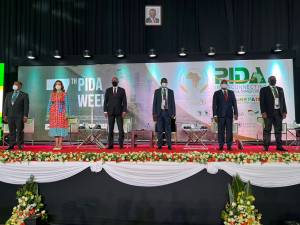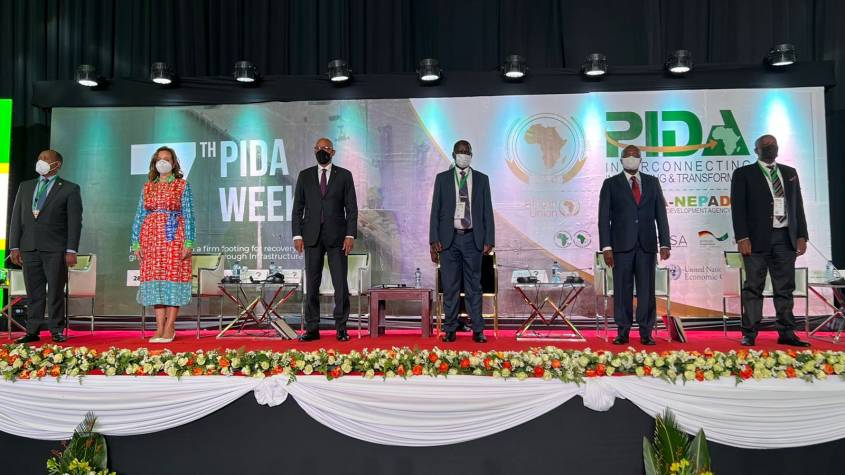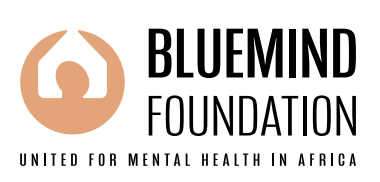7th PIDA Week reemphasize infrastructure investment’s role in Africa’s recovery
The 7th Programme for Infrastructure Development in Africa (PIDA) Week, Africa’s premier forum for accelerating infrastructure implementation, commenced Monday in Nairobi, Kenya.

The weeklong event themed: “Putting Africa on a firm footing for recovery, growth, and resilience through Infrastructure” is being hosted by the Government of Kenya and the African Union Development Agency (AUDA-NEPAD), among others. This year’s theme is very similar to that of the 6th PIDA Week held virtually in January, 2021: “New decade, new realities, new priorities – positioning PIDA and infrastructure development in Africa’s continued growth and economic recovery.”
As Africa continues to grapple with the aftermath of Covid-19 pandemic, the 7th PIDA Week assembles African political and business leaders as well as international partners to brainstorm on how to tackle blockages against the much-needed resources necessary to boost infrastructure development on the continent. Along with the African Continental Free Trade Area (AfCFTA), PIDA is seen to be crucial in delivering on Africa’s vision for inclusive and sustainable development.
Kenya’s President Uhuru Kenyatta, who spoke at the 7th PIDA Week opening ceremony through Kenya’s cabinet secretary for transport and infrastructure, James Macharia, described the Covid-19 pandemic as a major setback to Africa’s infrastructure development, one that had apparently weakened the continent’s already underfunded infrastructure sector. Kenyatta noted Africa’s huge infrastructure funding deficit associated with risks regarding projects bankability and preparation, despite the continent having investment-worthy infrastructure projects.
“As African countries, there is a need to emphasize on policies and strategies that will stimulate domestic resource mobilization, attract private investment and create an environment that attracts the growth of quality infrastructure projects. I, therefore, urge for deeper engagement between PIDA, the private sector, and development partners,” President Kenyatta said.
Ms Amani Abou‐Zeid, the AU’s commissioner for infrastructure and energy, said the Second PIDA Priority Action Plan (PIDA- PAP2) was well-structured to address President Kenyatta’s concerns on projects’ bankability, underlining the need for African infrastructure projects to be inclusive, sustainable, and gender smart. “So, this is a call for action and implementation, for the private sector financiers, donors, and partners to invest in these projects that produce a win-win outcome.”
Mr Raila Odinga, the AU’s high representative for infrastructure development cum past prime minister of Kenya, said efforts towards mainstreaming infrastructure as a tool for Africa’s integration and economic growth were yielding notable results. Mr Odinga said between 2013 and 2017, the average annual funding for infrastructure development in Africa rose to USD $77 billion, from about USD $39 billion in the first quarter of the 21st century.
“West and East Africa have particularly been resurgent in this aspect. Although there is much concern about Chinese investment in Africa’s infrastructure, governments in the continent have substantially increased their spending on infrastructure, which now stands at around 42%. Our governments are making bold commitments to pursue infrastructure as a pillar for the continent’s integration agenda.” Mr Odinga concluded.
Dr. Ibrahim Mayaki, the outgoing CEO of AUDA-NEPAD, noted the significant progress recorded in the implementation of the AfCFTA, yet said for Africa to maximize the benefits of the free trade area, the continent must invest in infrastructure. “As a continent, we have made considerable progress in the implementation of the African Continental Free Trade Area (AfCFTA). However, for it to become the game-changer that we so desire, we must put in place the necessary infrastructure that will be the key enabler of Intra Africa Trade,” said Dr. Mayaki.
Among other key activities, the 2022 PIDA Week features the official launch of the Continental Africa Water Investment Programme (AIP) – AIP-PIDA Water Scorecard. AIP is a pan-African programme aimed at transforming the investment outlook for climate-resilient water and sanitation investments on the continent. This is in addition to the launch of the PIDA Quality Label certification awards, which reflects infrastructure projects’ adherence to international best practices in project preparation.

















